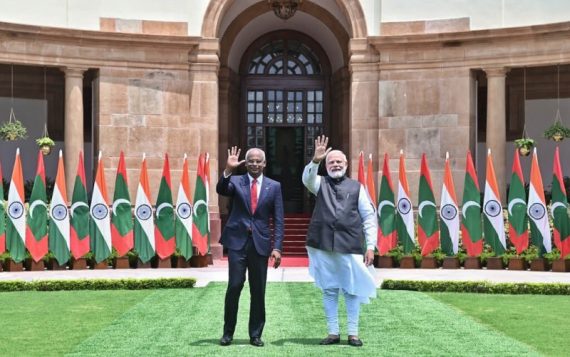T
he diplomatic landscape in the Indian Ocean region witnessed a significant development as China and the Maldives solidified their relationship through a comprehensive strategic cooperative partnership. President Mohamed Muizzu’s state visit to Beijing marked a turning point in the geopolitical dynamics of the region, with the two nations signaling a commitment to enhanced collaboration across various sectors. This report delves into the implications, motivations, and potential consequences of this evolving partnership.
President Muizzu’s election in November brought forth a unique campaign narrative, distinctly characterized by the slogan “India Out.” The President, in his electoral bid, portrayed India as a threat to the Maldives’ sovereignty, challenging the influence exerted by New Delhi. Since assuming office, Muizzu’s administration has taken bold steps, including the expulsion of Indian military personnel and the pursuit of Chinese investments despite the Maldives’ considerable debt to Beijing.
Chinese President Xi Jinping, during the talks at the Great Hall of the People, referred to President Muizzu as an “old friend,” emphasizing the historic opportunity for both nations to build on their past and forge ahead into the future. The elevation of bilateral ties to a “comprehensive strategic cooperative partnership” sets the stage for deeper collaboration, encompassing economic, political, and infrastructure domains.
Strategic implications
The upgrading of relations between China and the Maldives holds broader strategic implications for the Indian Ocean region. The move aligns with China’s broader Belt and Road Initiative, strengthening its influence in strategically vital maritime territories. As the Maldives pivots towards China, the regional balance of power undergoes a subtle shift, echoing similar dynamics observed in neighboring countries.
The Maldives, grappling with significant public debt, finds China as its most substantial bilateral creditor. The debt, amounting to $1.37 billion, represents around 20% of the Maldives’ total public debt. Despite concerns raised by international financial institutions, the Maldives has welcomed further Chinese investments, with Chinese firms injecting an additional $1.37 billion since the Maldives joined the Belt and Road Initiative in 2014.
The strategic partnership between China and the Maldives sends ripples across the geopolitical landscape, particularly impacting regional players. India, the Maldives’ historical ally, now faces a shifting dynamic in its immediate maritime neighborhood. The Maldives’ tilt towards China mirrors trends observed in Sri Lanka, indicating China’s expanding influence in the Indian Ocean.
World bank caution and domestic challenges
While Chinese investments contribute significantly to the Maldives’ economic success, concerns have been raised by the World Bank. A development report from October warned of a potential build-up of sovereign exposure during the pandemic, coupled with a lack of domestic investment opportunities. The Maldives, according to the report, should carefully navigate its economic policies to avoid over-reliance on external partners.
President Xi expressed support for increasing direct flights between China and the Maldives, a move that could significantly benefit the Maldives’ tourism sector. With tourism contributing 79% to economic growth in 2022, the country seeks to leverage Chinese connectivity to boost its travel industry. Additionally, China’s commitment to infrastructure development aligns with the Maldives’ aspirations for economic diversification.
The strategic partnership between China and the Maldives represents a geopolitical shift with far-reaching consequences. As the Maldives reorients its diplomatic and economic ties, the regional balance of power undergoes subtle transformations. The Maldives-China axis adds complexity to an already intricate geopolitical puzzle in the Indian Ocean, demanding close attention from international observers. The future trajectory of this partnership will likely shape the geopolitical dynamics of the region in the years to come.
Source: CNBC News and Reuters
Recommended





